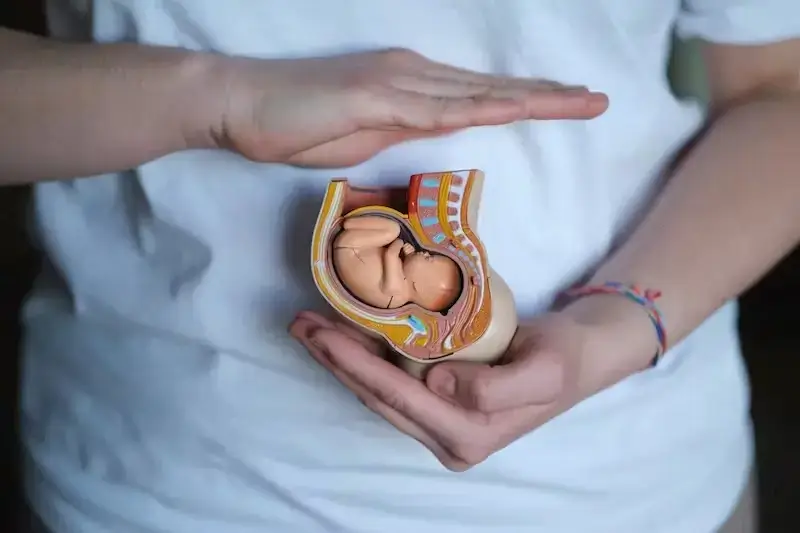
If you are 10 weeks pregnant, congratulations! Your baby has reached the fetal stage of development and is the size of a large olive. Your bump is growing, and you may finally be ready to switch to maternity clothes.
Related: Symptoms and Management of HPV During Pregnancy
10 Weeks Pregnant – Fetus

At 10 weeks pregnant – Wow! You and your baby are officially entering the fetal period. During this stage of pregnancy, your baby’s major organs (brain, intestines, liver, kidneys, now producing urine, spinal cord, etc) and starting to function. The yolk sac is gradually disappearing and the developing liver takes over the task of making red blood cells.
Your baby keeps growing fast, now measuring 1.2 inch/ 3.1 cm, the size of a large olive, and weighs about 0.1 of an ounce (about 4 grams). He will double in size in the following weeks.
The webbing between the fingers and toes has disappeared, teeth and nails are forming, and baby can now bend his limbs which are growing longer (and kicking!). Silky hair (lanugo) is growing on semi-translucent skin. The fetus is now swallowing amniotic fluid and will soon start producing digestive juices. The head is still enormous, measuring half of his body.
Related: How Can I Tell If I Am Pregnant With Twins?
10 Weeks Pregnant – Symptoms
At 10 weeks pregnant, your tummy keeps growing! That favorite pair of jeans might feel unpleasantly tight, and your breasts seem bigger (and they probably are). You might prefer switching to more comfortable clothes with elastic waistbands, and get yourself a new bra. If you don’t want to give up on your pre-pregnancy pants just yet and still haven’t started gaining weight, here’s a handy trick – take a simple rubber band and thread it through the button hole. Secure the band to the button hole by threading one end of the rubber band through the other. This is your new button hole. Pull the button through the band end and make sure your blouse is long enough to cover the area.
If you wake up in the morning and find a network of prominent blue veins on your breasts and abdomen, don’t panic. Your blood volume increases by 20% – 40% during pregnancy, and the veins are the symptom. They will go away after delivery.
On the bright side, your nausea might already be subsiding! If you’re still vomiting, worry not. It will get better in a few weeks. As the second trimester begins, you will probably start gaining weight more quickly. You will also find that you’re not as exhausted as you used to be during the first trimester. In fact, may women feel great during their second trimester – the nausea and fatigue is gone, the lower back pain that is sure to come during the third trimester is not bothering you yet and the breasts look wonderful. Constipation, headaches, mood swings and increased vaginal discharge might still bother you from time to time, but we can’t have it all.
Do your best to continue exercising – keeping in shape may make pregnancy easier. Swimming, yoga, walking and Pilates are all great. If you’re weightlifting, consult your doctor and your coach. You will be able to keep exercising with some adjustments. Listen to your body well, and don’t try to match your pre-pregnancy achievements – you will have time for that after delivery.
Related: 10 Best Movies You Should Watch When You’re Pregnant
10 Weeks Pregnant – Questions
At 10 weeks pregnant, you’re more likely to suffer from a few common vaginal infections. Let’s see how you recognize these infections and treat them.
1. How to Treat Yeast Infections?
Yeast infections are extremely common, and you’re more likely to have them during pregnancy due to the rising levels of estrogen that makes it easier for the yeast fungi to spread. The infection can pass to the baby if you have it during labor, but is not dangerous and is easily treatable. However, it is extremely irritating for the mother. Symptoms include:
- White or creamy, or cheesy, odorless vaginal discharge.
- Itchiness, soreness, redness or burning in the vagina and labia, especially while urinating or during intercourse.
To reduce your chances of getting a yeast infection, keep your genital area clean and dry, wear breathable, cotton underwear, wipe front to back and eat bio yogurts, as they contain Bifid bacteria and Lactobacillus acidophilus – two types of bacteria that are supposed to help maintain the optimal bacterial balance in your body. Try to avoid foods that contain sugar and white flour. If you think you have a yeast infection, don’t treat it yourself and see your doctor.
Related: What Are Common Discomforts During Pregnancy?
2. How to Treat a Bacterial Vaginosis?
As Bacterial Vaginosis (BV) has been linked to an increased risk of preterm labor, it is potentially dangerous for your baby. About half of all women that suffer from BV have no symptoms, but possible symptoms include:
- Itchiness/irritation around the vagina and vulva.
- Thin, white or gray discharge with fishy odor, especially after intercourse.
If you think you have Bacterial Vaginosis, see your caregiver. If you have the symptoms, your caregiver will screen you for BV. As BV sometimes goes away on its own, your caregiver may wait to treat it (if you’re in your first trimester the treatment may be postponed until the second trimester). Otherwise, you may be prescribed a course of antibiotics.
To reduce your chances of getting BV, keep your genital area clean and dry, wear breathable, cotton underwear and wipe front to back.
Related: The Ultimate Guide on How to Put the Baby to Sleep in 40 Seconds
Related: 11 Weeks Pregnant – Fetus





